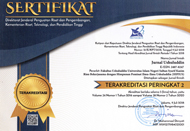The Dynamics of Hadith Studies in Southeast Asia: Study of Tanqîḥul Qawl by Imam Nawawi and Jawhar al-Mawḥȗb by Syekh Wan Ali
Abstract
Keywords
Full Text:
PDFReferences
Abdullah, Wahyu Hidayat, and Muhammad Mustaqim. “Some Aspects of Syeikh Wan Ali Kutan Al- Kalantani ’ s Religious Thought in Al-Jawhar Al-Mawḥub Wa Munabbihat Al-Qulub.” ResearchGate (2014): 260.
al-Asqalani, Ibnu Hajar. Fathul Bâri Bi Sharhi Ṣaḥiḥ al-Bukhari. n.d.
al-Bantani, Nawawi. Syarah Tanqîḥul Qawl al-Hasis fî Sharhil Lubâbul Hadîth. n.d.
Amin, Syamsul Munir. Sayyid Ulama Hijaz Biografi Syaikh Nawawi al-Bantani. Yogyakarta: LkiS, 2009.
Amrizal. “Eksistensi Tradisi Kajian Kitab Kuning dalam Lingkup Perubahan Sosial (Studi Kasus di Pesantren Darun Nahdhah, Darel Hikmah, dan Babussalam).” Sosial Budaya 13, no. 1 (2016): 73.
Arwansyah. “Peran Syaikh Nawawi al-Bantani dalam Penyebaran Islam di Nusantara (The Role of the Syaikh Nawawi al-Bantani in Islamic Dakwa in the Indonesia Archipelago).” Kontekstualita 30, no. 1 (2015): 73–74.
Azami, Muhammad Musthofa. Studies in Early Hadith Literature. Burr Ridge: American Trust Publications, 1978.
Aziz, Muhammad, and Moh. Agus Sifa. “Telaah Kritis Pemikiran Hermeneutika ‘Double Movement’ Fazlur Rahman (1919-1988).” Al-Hikmah 8, no. 1 (2018).
Burhanuddin, Mamat S. “Kajian Kontemporer Terhadap Karya Nawawi al-Bantani.” Dinika 4, no. 1 (2019): 98.
Hafidhuddin and Saifuddin Zuhri Qudsi. “Nawawi al-Bantani, Ashhab al-Jawiyyin di Bidang Hadis: Rihlah, Genealogi Intelektual, dan Tradisi Sanad Hadis.” Al-Izzah:Jurnal Hasil-Hasil Penelitian 16, no. 1 (2021): 19.
Hasan, Asyari, and Dede Sahuddin. “Relevansi Pemikiran Tasawuf Syekh Nawawi al- Bantani dengan Ekonomi Islam.” Syifa al-Qulub 06, no. 02 (2022).
Hasibuan, Hadi Rafitra. “Aliran Asy’ariyyah (Kajian Historis dan Pengaruh Aliran Kalam Asy’Ariyah).” Al-Hadi 2, no. 2 (2017): 435.
Helmiati. Islam dalam Masyarakat dan Politik Malaysia. Pekanbaru: Suska Press, 2016.
Kalantani, Ali bin Abd al-Rahman. Al-Jawhar al-Mauḥȗb wa Munabbihat al-Qulȗb. n.d.
———. Zahrah al-Murid. 1396 H.
Karim, M. Abdul. Sejarah Pemikiran dan Peradaban Islam. Yogyakarta: Pustaka Book Publisher, 2007.
Khaeruman, Badri. “Perkembangan Hadis Di Indonesia Pada Abad XX.” Diroyah: Jurnal Ilmu Hadis 2, no. 105 (2017): 190.
Mahdy, Fakhri Tajuddin. Metodologi Syarah Hadis Nabi SAW. (Telaah Kitab Tanqih Al-Qawl Al-Hasis Fi Syarah Lubab Al-Hadis Karya Imam Nawawi Al-Bantani). Tesis. Makassar: UIN Alauddin, 2016.
Muhammad, bin Abdullah al-Hajar Dani al-Damyati. Jawahirul Lu’luiyyah fî Sharhi al-Arba’in an-Nabawiyyah. 1331.
Muhtador, Moh. “Sejarah Perkembangan Metode Dan Pedekatan Syarah Hadis.” Riwayah: Jurnal Studi Hadis 2 (2016): 261.
Muizuddin. Tipologi Pemikiran Hadis Kontemporer. Banda Aceh: Ar-Raniry Press, 2012.
Mukani. “Ulama al-Jawwi di Arab Saudi dan Kebangkitan Umat Islam di Indonesia.” Al-Murabbi 2, no. 2 (2016): 214.
Nasution, Syamruddin. “Kajian Naskah: Kitab Sairu Al-Salikin Li Babi Ihya ’Ulumuddin Karya Syekh Ali Ibn Abdurrahman al-Kalantani.” Sosial Budaya 11, no. 1 (2014): 73.
Noorhidayati, Salamah. Kritik Teks Hadis. Yogyakarta: Dialektika, 2017.
Nuhdi, Asep. “Pendidikan Anak Usia Dini Dalam Perspektif Syekh Nawawi al-Bantani Kajian Kitab Uqud al-Lujain, Tanqih al-Qawl dan Maraqi al-Ubudiyyah.” Waladuna 2, no. 1 (2015): 25–41.
Olawale, Abdul Gafar. “‘Noble Morality’: The 18 Hadisth of Imam an-Nawawi’s Collection as a Strategy for Change in Nigeria.” Ilorin Journal of Religious Studies (IJOURELS) 7, no. 1 (2017): 10.
Pransiska, Toni. “Konsep I’rab Dalam Ilmu Nahwu (Sebuah Kajian Epistemologis).” al-Mahara 1, no. 1 (2015): 13.
Priyanto, Aris. “Konsep Maqamat Menurut Syekh Nawawi al-Bantani dalam Kitab Salalim Al-Fudala.” Journal of Sufism and Psychoteraphy 1, no. 1 (2021): 32–50.
Roff, William R. Kelantan: Religion, Society, and Politics in a Malay State. Oxford: Oxford University Press, 1974.
Rohman, Abdul. “Perkembangan Islam dan Gerakan Politiknya di Malaysia.” Jurnal Politik Walisongo 2, no. 1 (2020): 29.
Rohmatika, Ratu Vina. “Fanatisme Beragama Yes, Ekstrimisme Beragama No.” Al-Adyan 13, no. 1 (2018): 2.
Rokhim, Abdul. “Hadis Dhaif dan Kehujjahannya (Telaah Terhadap Kontroversi Penerapan Ulama Sebagai Sumber Hukum).” Al-Ihkam 4, no. 2 (2009): 195.
Rosia, Rina. “Pemikiran Tasawuf Imam Ghazali dalam Pendidikan Islam.” Jurnal Inspirasi 1, no. 3 (2018): 87.
Shukri bin Haji Muda, Sa'ad , ʻAbdullah al-Qari Haji Salleh, and Abdurrahman al-Ahmadi, Detik-detik Sejarah Kelantan Kota Bharu: Pustaka Aman Press, 1971.
Santosa, Sandi. “Melacak Jejak Pensyarahan Kitab Hadis.” Diroyah: Jurnal Ilmu Hadis 1, no. 2 (2016): 80.
Sanusi, Ahmad. “The Contributions of Nawawi al-Bantani In the Development of National Law of Indonesia.” Al-’Adalah 15, no. 2 (2018): 415–436.
Shihabuddin, A. Telaah Kritis Atas Doktrin Salafi Atau Wahabi. Yogyakarta: 2007.
Suhaimi, Mahfuz Bin, Latifah Binti Abdul Majid, and Ahamad Asmadi Bin Sakat. “Metodologi Penulisan Hadith Syeikh Ali Ibn Abdul Rahman al-Kalantani dalam al-Jawhar al-Mauhub wa Munabbihat al-Qulub.” Jurnal Pengajian Islam, Akademi Islam Kuis 8, no. 1 (2015): 4.
Sukayat, Tata. “Nadzom Sebagai Media Pendidikan dan Dakwah.” Cendekia 15, no. 2 (2017): 342.
Suwarjin. “Biografi Intelektual Syekh Nawawi al-Bantani.” Tsaqofah & Tarikh 2, no. 2 (2017): 194.
———. “Transformasi Pemikiran Hukum Keluarga Islam Syekh Nawawi al-Bantani ke dalam Kompilasi Hukum Islam.” Qiyas 5, no. 2 (2020): 140–147.
Tim PWNU Jawa Timur. Aswaja an Nahdliyah Ajaran Ahlusunnah Wa al-Jama’ah yang Berlaku di Lingkungan Nahdlatul Ulama. Malang: Khalista, 2009.
Toni, Hariya. “Pesantren Sebagai Potensi Pengembangan Dakwah Islam Pendahuluan.” Jurnal Dakwah dan Komunikasi 1, no. 1 (2016): 97.
Widiyarti. “Argumentasi Syekh Nawawi Bin Umar al-Bantani Tentang Kedudukan Perempuan dalam Keluarga Kajian Fiqh Kesetaraan.” Ijougs: Indonesia Journal of Gender Studies 2, no. 1 (2021): 59–81.
Zulkarnain. “Teologi Islam dan Fanatisme Perilaku Sosial Beragama.” Al-Hikmah 3, no. 2 (2021): 196.
DOI: http://dx.doi.org/10.24014/jush.v31i1.21966
Refbacks
- There are currently no refbacks.
 Jurnal Ushuluddin Indexed By:
Jurnal Ushuluddin Indexed By:
Alamat Redaksi:
 Fakultas Ushuluddin UIN SUSKA Riau Jl. H.R. Soebrantas KM. 15,5 Panam – Pekanbaru
Fakultas Ushuluddin UIN SUSKA Riau Jl. H.R. Soebrantas KM. 15,5 Panam – Pekanbaru
 E-mail: jurnal.ushuluddin@uin-suska.ac.id
E-mail: jurnal.ushuluddin@uin-suska.ac.id
ejournal: http://ejournal.uin-suska.ac.id/index.php/ushuludin

Jurnal Ushuluddin is licensed under a Lisensi Creative Commons Atribusi 4.0 Internasional.

















